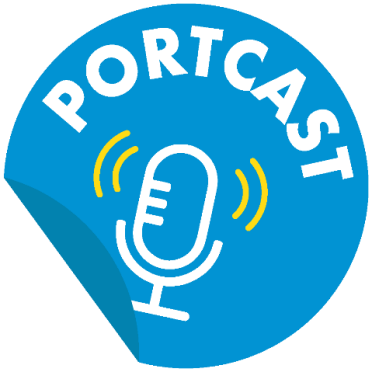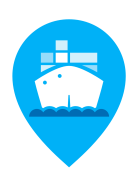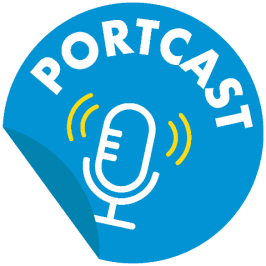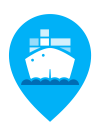How does visibility of your container from sea to inland contribute to CO2 reduction and a more sustainable chain? Learn how Portbase (the port community system for the port of Rotterdam) and APM Terminals Maasvlakte 2 are working together to achieve supply chain resilience and help cargo owners in making their operations more sustainable in the podcast Supply Chain Talks:
Supply Chain Talks
Podcast

Donald Baan (Portbase): ‘It is in line with our vision to make data available smoothly and securely. We've been doing that for some 20 years already, for and together with the port community which currently consists of more than 5,000 affiliated companies. From our neutral, not-for-profit role, we naturally listen carefully to the wishes and needs of the market and translate them into scalable, secure and sustainable data exchange between partners in the supply chain. Central to this is providing added value for the port community. So we are really pleased that we have been able to add this data from terminals to Cargo Controller, and consequently provide added value for both data supplier and data customer. We also see opportunities for further applying this model in the future for the other target groups.’
From the first quarter of 2024 on, clients of the Rotterdam port will be able to make use of the information from Cargo Controller by way of web screens and a direct system link. This meets the port community's wish to receive this data from Portbase directly in its own operational systems.
API available soon

All players in the chain will benefit from this development. Making data centrally available to shippers, freight forwarders and carriers leads to better planning and the choice of the most suitable monitoring modality. We expect that this will lead to more containers being transported by inland shipping and rail, which will directly contribute to the sustainability of container logistics via the port of Rotterdam.
Value for hinterland parties
The complexity of this development lay mainly in the fact that data providers increasingly want to set their own conditions for use of their information. Portbase resolved this by allowing data providers to share their data through Cargo Controller on the basis of the conditions of and authorisation by the data owner. This is in line with our vision that securely sharing reliable data strengthens the entire chain.
Good agreements
Mathijs Gommers, owner/director of PVY Logistics: ‘We're very satisfied with the expansion of terminal ETA information in Portbase Cargo Controller. A lot of logistics information is fragmented in the port. Until recently, that was also the case for information regarding the arrival of vessels in the port of Rotterdam. This integration enables us to optimise our planning and makes us better able to inform our clients about the status of their shipment.’

Proof of Concept
The aim was to have the market's most reliable information available at a single location, so that planning and operation can be optimised. We succeeded in that by creating the possibility of integrating the data elements pertaining to such information as the ETA from the terminals into the Portbase service, Cargo Controller.
Throughout the Proof of Concept, users indicated that they would prefer to receive this data centrally, through a Portbase service or a system link that can be integrated into their existing operational systems.
The Port of Rotterdam Authority and Portbase developed a Proof of Concept together, in which more than 15 companies, including shippers, carriers and freight forwarders, took part. They also indicated how they would prefer to receive their ETA information. Deep-sea terminals and other companies always provide ETA predictions based on their own schedules, in some cases even including the expected unloading time of a container.
As Port Authority, we have been working for years on making accurate ETA information (Estimated Time of Arrival) centrally available ahead of time. It is, after all, really important for shippers, carriers and freight forwarding companies to know when the vessel with their container(s) has docked and when the containers will be unloaded and released for further transport to the hinterland. It allows shippers to optimise their planning and gives them better insight into their freight flows. Shippers and freight forwarding companies can optimise their planning and inform their clients ahead of time with the best information available. That way, reliable data leads to efficiency for everyone. Improved ETA information could save the market tens of millions of euros. That was revealed by research the Port of Rotterdam Authority had done at 124 companies.
Where is the vessel with my container? That’s always the key question for companies who receive containers from our port or arrange their transport. From now on, following a successful Proof of Concept, shippers, freight forwarders and carriers will have access to ETA information from the terminals, through the Portbase service Cargo Controller. This is a big step, which will lead to increased efficiency in whole transport chains.

Case study 5
Scroll down

How does visibility of your container from sea to inland contribute to CO2 reduction and a more sustainable chain? Learn how Portbase (the port community system for the port of Rotterdam) and APM Terminals Maasvlakte 2 are working together to achieve supply chain resilience and help cargo owners in making their operations more sustainable in the podcast Supply Chain Talks:
Supply Chain Talks
Podcast
Donald Baan (Portbase): ‘It is in line with our vision to make data available smoothly and securely. We've been doing that for some 20 years already, for and together with the port community which currently consists of more than 5,000 affiliated companies. From our neutral, not-for-profit role, we naturally listen carefully to the wishes and needs of the market and translate them into scalable, secure and sustainable data exchange between partners in the supply chain. Central to this is providing added value for the port community. So we are really pleased that we have been able to add this data from terminals to Cargo Controller, and consequently provide added value for both data supplier and data customer. We also see opportunities for further applying this model in the future for the other target groups.’
From the first quarter of 2024 on, clients of the Rotterdam port will be able to make use of the information from Cargo Controller by way of web screens and a direct system link. This meets the port community's wish to receive this data from Portbase directly in its own operational systems.
API available soon

All players in the chain will benefit from this development. Making data centrally available to shippers, freight forwarders and carriers leads to better planning and the choice of the most suitable monitoring modality. We expect that this will lead to more containers being transported by inland shipping and rail, which will directly contribute to the sustainability of container logistics via the port of Rotterdam.
Value for hinterland parties
The complexity of this development lay mainly in the fact that data providers increasingly want to set their own conditions for use of their information. Portbase resolved this by allowing data providers to share their data through Cargo Controller on the basis of the conditions of and authorisation by the data owner. This is in line with our vision that securely sharing reliable data strengthens the entire chain.
Good agreements

Mathijs Gommers, owner/director of PVY Logistics: ‘We're very satisfied with the expansion of terminal ETA information in Portbase Cargo Controller. A lot of logistics information is fragmented in the port. Until recently, that was also the case for information regarding the arrival of vessels in the port of Rotterdam. This integration enables us to optimise our planning and makes us better able to inform our clients about the status of their shipment.’
Proof of Concept
The aim was to have the market's most reliable information available at a single location, so that planning and operation can be optimised. We succeeded in that by creating the possibility of integrating the data elements pertaining to such information as the ETA from the terminals into the Portbase service, Cargo Controller.
Throughout the Proof of Concept, users indicated that they would prefer to receive this data centrally, through a Portbase service or a system link that can be integrated into their existing operational systems.
The Port of Rotterdam Authority and Portbase developed a Proof of Concept together, in which more than 15 companies, including shippers, carriers and freight forwarders, took part. They also indicated how they would prefer to receive their ETA information. Deep-sea terminals and other companies always provide ETA predictions based on their own schedules, in some cases even including the expected unloading time of a container.
As Port Authority, we have been working for years on making accurate ETA information (Estimated Time of Arrival) centrally available ahead of time. It is, after all, really important for shippers, carriers and freight forwarding companies to know when the vessel with their container(s) has docked and when the containers will be unloaded and released for further transport to the hinterland. It allows shippers to optimise their planning and gives them better insight into their freight flows. Shippers and freight forwarding companies can optimise their planning and inform their clients ahead of time with the best information available. That way, reliable data leads to efficiency for everyone. Improved ETA information could save the market tens of millions of euros. That was revealed by research the Port of Rotterdam Authority had done at 124 companies.
Where is the vessel with my container? That’s always the key question for companies who receive containers from our port or arrange their transport. From now on, following a successful Proof of Concept, shippers, freight forwarders and carriers will have access to ETA information from the terminals, through the Portbase service Cargo Controller. This is a big step, which will lead to increased efficiency in whole transport chains.

Case study 5